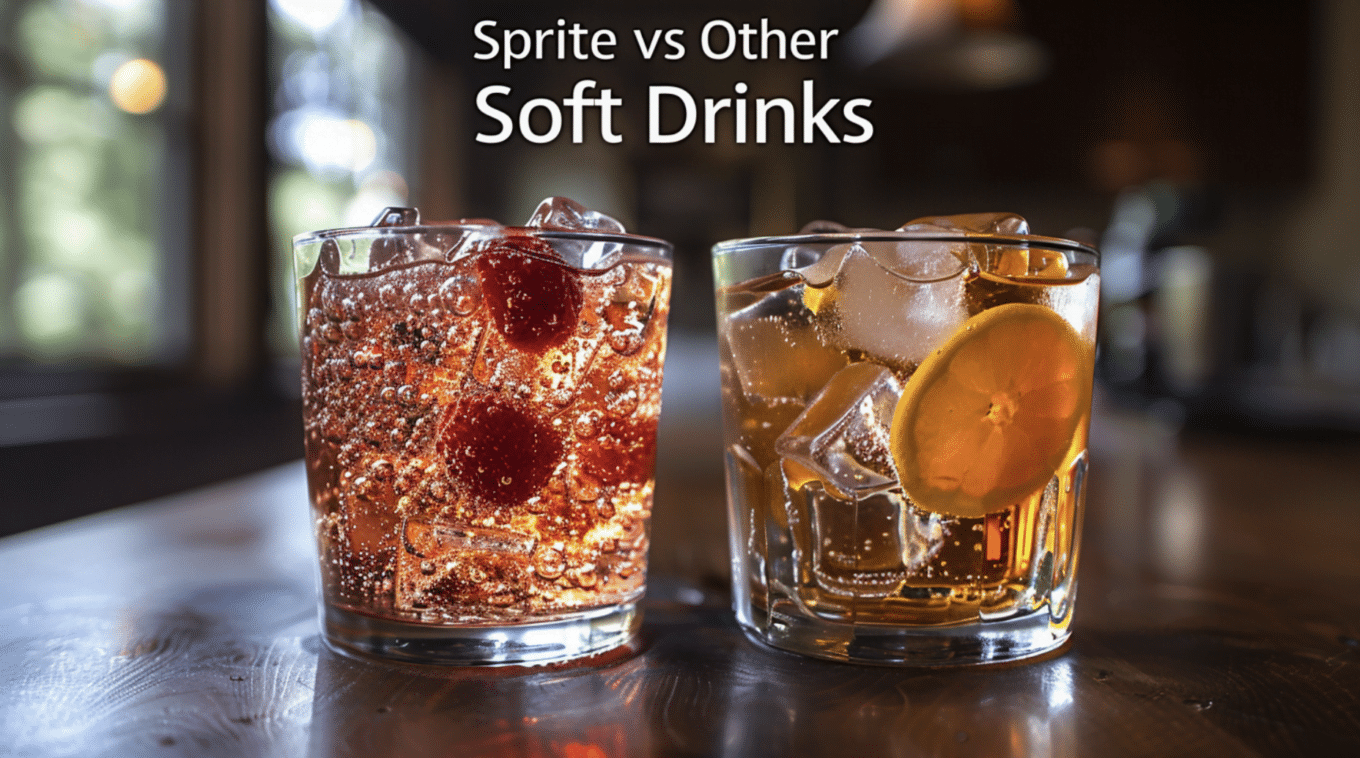Is Sprite bad for you? Many have wondered as we reach for that refreshing, fizzy drink.
While it’s no secret that soft drinks aren’t the healthiest beverage choice, you might be surprised to learn just how Sprite stacks up against other popular options.
The health risks of regularly consuming soft drinks like Sprite go beyond oral health.
In this article, we’ll examine the potential dangers lurking in that iconic green bottle and compare Sprite to other soft drinks regarding sugar content, acidity, and other factors that can impact overall well-being.
By the end of this post, you’ll have a clearer understanding of the health risks associated with Sprite and other sodas and some helpful tips for quenching your thirst more healthily.
Nutritional Content Comparison
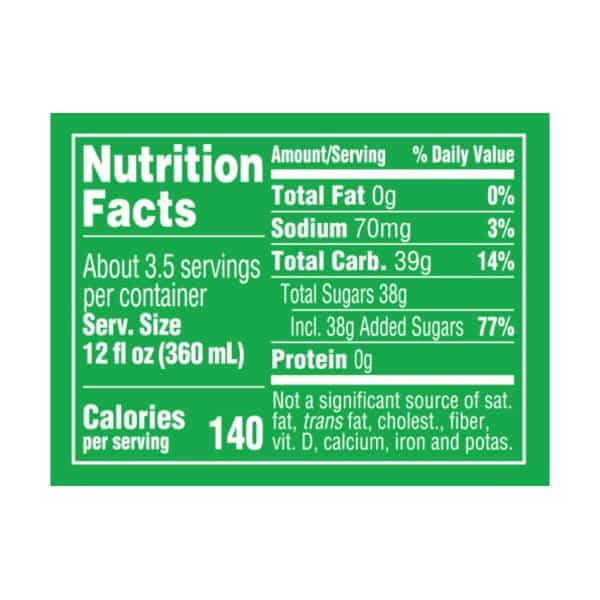
Examining the nutritional content of Sprite and other soft drinks is crucial when evaluating their health risks.
Let’s examine these popular drinks’ calories, sugar content, artificial sweeteners, and preservatives.
Calories and Sugar Content
Did you know that a 12-oz can of Sprite contains 140 calories and 38 grams of sugar? That’s nearly ten teaspoons of sugar in just one serving!
Other popular soft drinks like Coca-Cola and Pepsi have similar calorie and sugar content.
Consuming excessive amounts of added sugar can lead to weight gain, obesity, and an increased risk of chronic diseases such as diabetes and heart disease.
Artificial Sweeteners and Their Health Risks
While Sprite does not contain artificial sweeteners, many other soft drinks, particularly diet versions, rely heavily on them.
Aspartame and acesulfame potassium (Ace-K) are common artificial sweeteners in these beverages.
Although they are FDA-approved, some studies suggest that these sweeteners may have negative effects on gut bacteria and could even increase the risk of certain cancers.
More research is needed to fully understand the long-term health implications of consuming artificial sweeteners regularly.
Sodium Benzoate and Benzene Risks
Sprite, like many other soft drinks, contains the preservative sodium benzoate. When sodium benzoate combines with ascorbic acid (vitamin C), it can form benzene, a known carcinogen.
While the levels of benzene in soft drinks are typically well below the safety limits set by the FDA, it’s still a concern for those who consume these beverages frequently.
Some studies have also linked sodium benzoate to hyperactivity in children and increased inflammation in the body.
Specific Ingredients and Their Health Effects
From phosphoric acid in cola drinks to the high fructose corn syrup in many popular sodas, it’s important to understand what you’re putting into your body.
Let’s examine some of the specific ingredients in these beverages and how they can impact your health.
Phosphoric Acid in Cola Drinks
Did you know that the phosphoric acid in cola drinks can interfere with your body’s ability to absorb calcium? This can lead to weakened bones and an increased risk of osteoporosis.
A study published in the American Journal of Clinical Nutrition found that women who regularly consumed cola drinks had significantly lower bone mineral density than those who didn’t.
If you’re a fan of cola drinks, you might want to consider cutting back for the sake of your bone health.
Caffeine Content and Its Impacts
While Sprite is caffeine-free, many other popular soft drinks contain significant amounts of this stimulant. Consuming too much caffeine can lead to jitteriness, anxiety, and sleep disruption.
It can also cause digestive issues and increase your heart rate and blood pressure.
If you’re sensitive to caffeine or have underlying health conditions, it’s important to be mindful of your intake from soft drinks and other sources.
Acesulfame K and Aspartame in Sprite
Although Sprite doesn’t contain artificial sweeteners, many other lemon-lime sodas and diet soft drinks do. Acesulfame K and aspartame are two common artificial sweeteners found in these beverages.
While they are FDA-approved, some studies have raised concerns about their potential health risks, including a possible link to cancer and metabolic disorders.
As with any food additive, consuming these sweeteners in moderation is important.
High Fructose Corn Syrup in Other Soft Drinks
High fructose corn syrup (HFCS) is a sweetener in many popular soft drinks, including Coca-Cola and Pepsi.
Some studies have suggested that consuming high amounts of HFCS can contribute to obesity, diabetes, and other metabolic disorders.
A study published in the journal Global Public Health found that countries with higher HFCS availability had significantly higher rates of diabetes.
If you’re concerned about your HFCS intake, you might want to check the labels on your favorite soft drinks.
Comparing Popular Soft Drinks
Many of us have our go-to soft drink favorites. But have you ever stopped to consider how your preferred beverage compares to others regarding health?
Let’s look at two popular comparisons: Sprite vs. Coke and Sprite vs. 7Up.
1. Sprite vs. Coka Cola: A Health Perspective
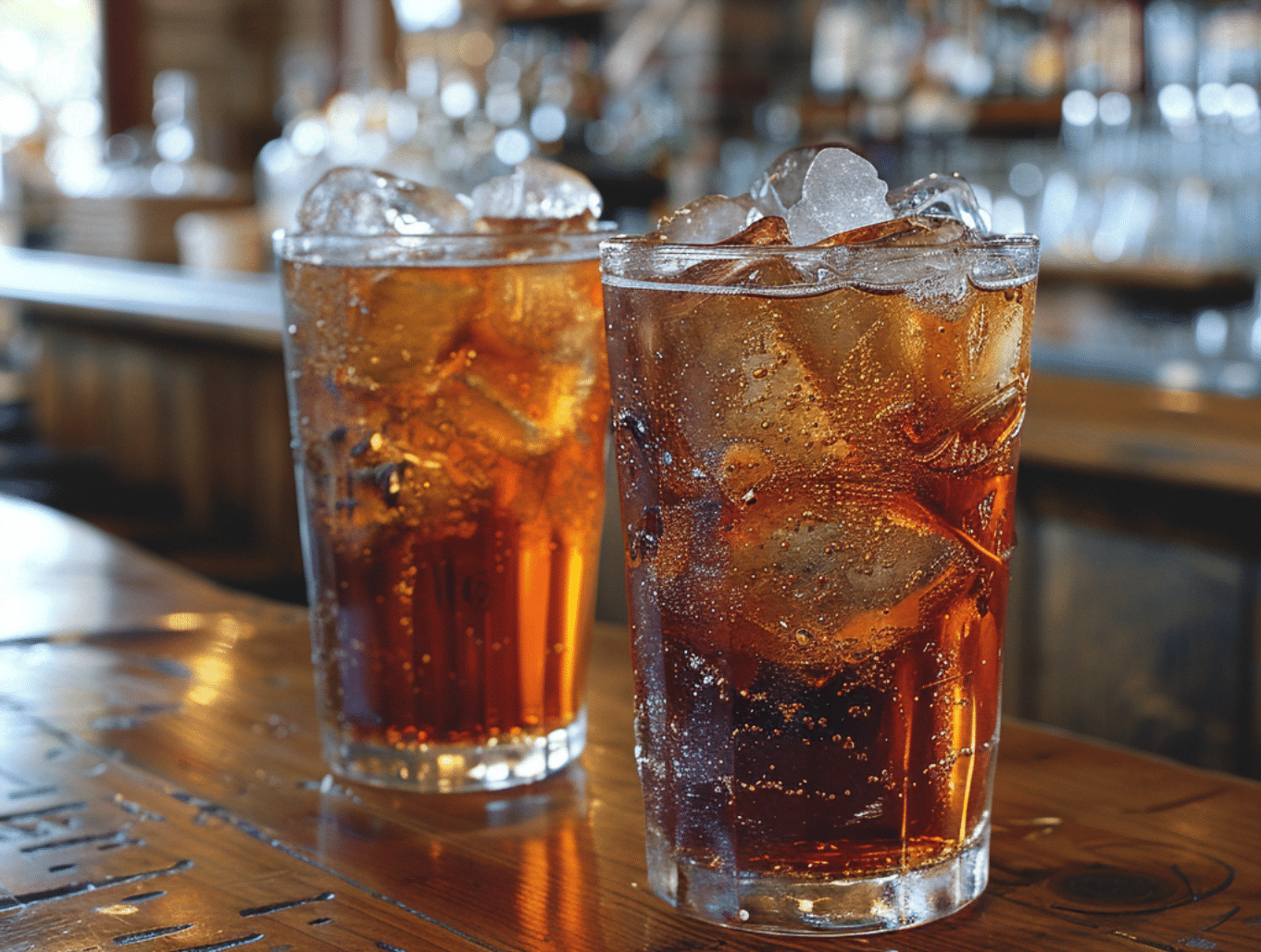
Sprite and Coca-Cola are two of the most well-known soft drinks worldwide, but they have some significant differences regarding their health impacts. Here’s what you need to know:
- Sugar content: A 12-oz can of Sprite contains 38 grams of sugar, while the same serving size of Coca-Cola has 39 grams. While the difference may seem negligible, it can add up over time.
- Caffeine: Sprite is caffeine-free, while Coca-Cola contains 34 mg per 12-oz can. Sprite may be the better choice if you’re sensitive to caffeine or trying to limit your intake.
- Acidity: Cola drinks like Coca-Cola are more acidic than Sprite, contributing to tooth erosion and other dental problems. A study published in the Journal of the American Dental Association found that cola drinks were more harmful to tooth enamel than non-cola drinks like Sprite.
- Phosphoric acid: As mentioned earlier, cola drinks contain phosphoric acid, which can interfere with calcium absorption and contribute to bone loss. Sprite does not contain this ingredient.
While neither beverage is a health food, Sprite may be the slightly better choice when compared to Coca-Cola, especially if you’re concerned about caffeine intake or dental health.
2. Sprite vs. 7Up: Ingredients and Flavors

Sprite and 7Up are both lemon-lime-flavored sodas, but they have some key differences in their ingredients and taste profiles. Here’s a closer look:
- Sweeteners: Sprite and 7Up contain high fructose corn syrup as their primary sweetener. However, some versions of 7Up also contain aspartame, an artificial sweetener linked to potential health risks.
- Citric acid: Sprite contains citric acid, which gives it a slightly tart flavor. 7Up, on the other hand, does not contain citric acid and has a smoother taste.
- Sodium benzoate: Both drinks contain the preservative sodium benzoate, which is linked to potential health concerns when consumed in large amounts.
- Caffeine: Neither Sprite nor 7Up contains caffeine, making them a good choice for those looking to avoid this stimulant.
- Flavors: While both drinks have a lemon-lime flavor, many people find that Sprite has a slightly stronger, more citrusy taste, while 7Up is milder and less tart.
Regarding health, there is no clear winner between Sprite and 7Up. Both contain added sugars and preservatives that should be consumed in moderation. Ultimately, choosing these two drinks may come from personal taste preferences.
Health Benefits and Risks
While enjoying a refreshing beverage like Sprite in moderation is unlikely to cause serious harm, it’s important to be aware of the potential risks associated with regular consumption.
Let’s examine some key health concerns related to Sprite and other soft drinks.
1. Weight Gain and Obesity

One of the most significant health risks associated with consuming sugary drinks like Sprite is the potential for weight gain and obesity. Consider these eye-opening facts:
- A single 12-oz can of Sprite contains 140 calories and 38 grams of sugar. Drinking just one can per day can lead to a weight gain of 15 pounds over a year!
- Sugary drinks are often consumed in addition to regular meals and snacks, leading to excess calorie intake. A study published in the American Journal of Clinical Nutrition found that for every additional serving of sugar-sweetened beverages consumed daily, the risk of obesity increased by 60%.
- The high fructose corn syrup found in many soft drinks, including Sprite, has been linked to increased belly fat accumulation, which is a risk factor for a variety of health problems, including diabetes and heart disease.
- To maintain a healthy weight, it is important to limit your intake of sugary drinks like Sprite and opt for healthier alternatives like water, unsweetened tea, or sparkling water with a splash of fruit juice.
2. Dental Health Concerns
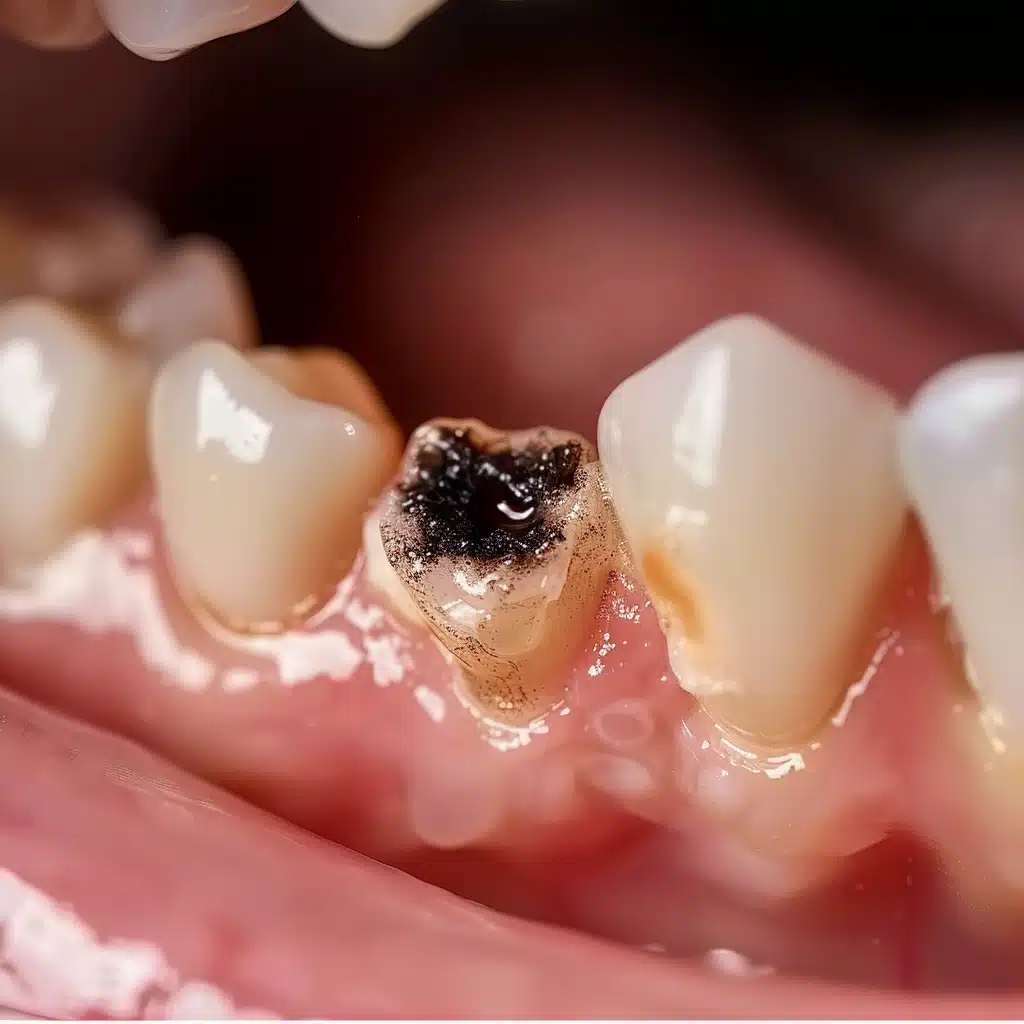
Drinks like Sprite, with their high sugar content and acidity, can lead to tooth decay and erosion over time.
A study published in the Journal of Zhejiang University found that exposing teeth to soft drinks for just 5 minutes led to significant enamel erosion.
To minimize the impact of soft drinks on your dental health, try to:
- Drink through a straw to limit contact with your teeth
- Rinse your mouth with water after consuming sugary or acidic drinks
- Wait at least 30 minutes before brushing your teeth to avoid further enamel damage
- Remember, while occasionally enjoying a Sprite is unlikely to cause long-term harm, regular consumption can damage dental health.
3. Potential for Acne and Skin Issues
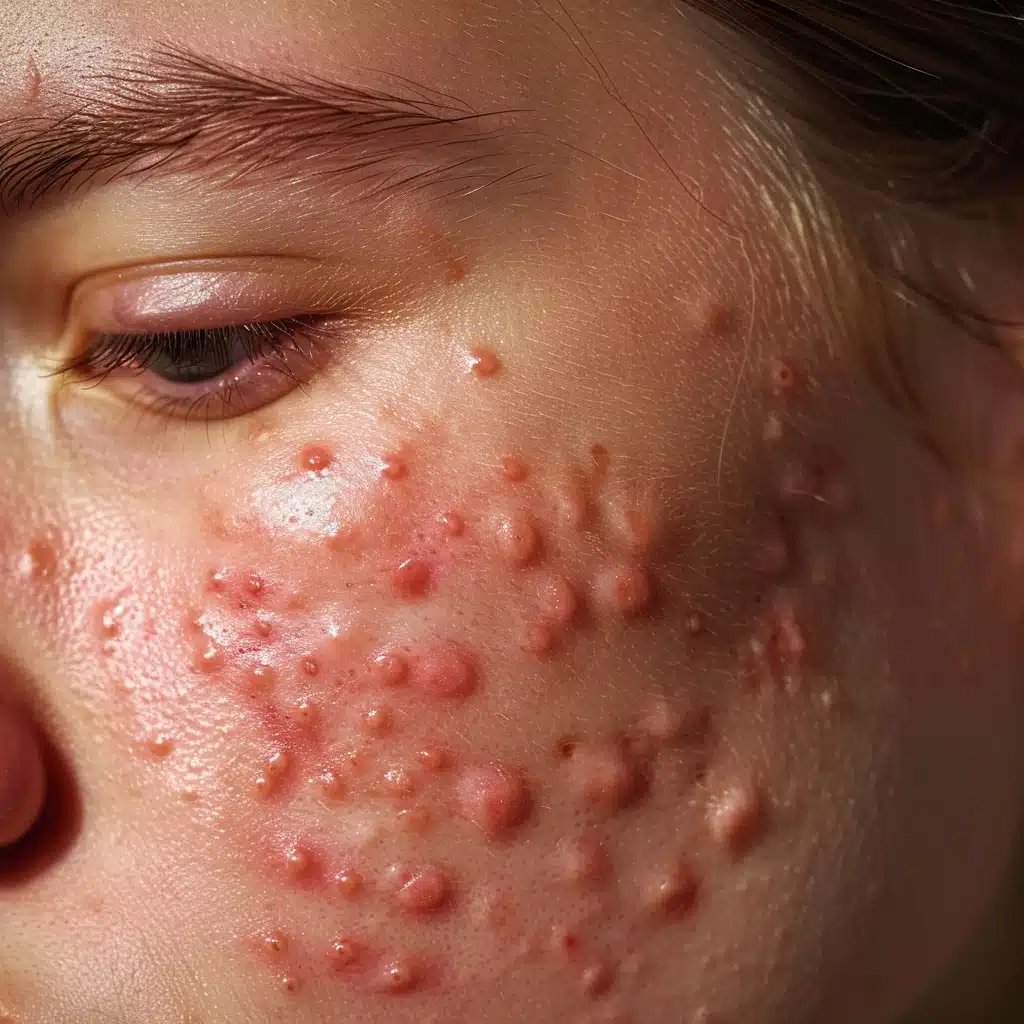
Have you ever noticed a breakout after indulging in sugary drinks like Sprite? You’re not alone.
The high sugar content in these beverages can contribute to inflammation and insulin resistance, both of which have been linked to the development of acne.
While more research is needed to understand the link between soft drinks and acne fully, it’s worth considering the potential impact on skin health when reaching for that next can of Sprite.
The Role of Carbonation
One of the most distinctive features of soft drinks like Sprite is the fizzy sensation caused by carbonation. But have you ever wondered how those bubbles affect your body?
Carbonation can have both positive and negative impacts on your health. Let’s explore the role of carbonation in Sprite and other soft drinks.
Digestive System and Sore Throat Relief
Have you ever reached for a Sprite when feeling under the weather? You’re not alone.
Many people find that the carbonation in soft drinks can temporarily relieve digestive issues like nausea and an upset stomach. The bubbles can help to release trapped gas and reduce bloating.
Additionally, the carbonation in Sprite and other soft drinks can help to soothe a sore throat. The cold, fizzy sensation can provide a numbing effect that temporarily relieves pain and discomfort.
However, it’s important to note that while carbonation may offer short-term relief, it’s not a long-term solution for digestive issues or sore throats.
The high sugar content in Sprite and other soft drinks can worsen symptoms over time.
Suppose you’ve been experiencing persistent digestive problems or a sore throat that lasts more than a few days.
In that case, it’s important to consult a healthcare professional to determine the underlying cause and appropriate treatment options.
Sprite’s Unique Carbonation Level
Did you know Sprite has a slightly different carbonation level than other popular soft drinks like Coca-Cola and Pepsi?
But what does this mean for your drinking experience? The higher carbonation level in Sprite can create a more intense fizzy sensation in your mouth, which some people find refreshing and enjoyable.
However, it’s worth noting that the carbonation level in soft drinks can also contribute to some negative health effects.
The carbonic acid created by the carbonation process can erode tooth enamel over time, increasing the risk of cavities and tooth decay.
Additionally, some studies have suggested that the carbonation in soft drinks may contribute to the development of gastroesophageal reflux disease (GERD) and other digestive issues, particularly when consumed in large amounts.
To minimize the potential negative impacts of carbonation on your health, it’s important to enjoy Sprite and other soft drinks in moderation and to practice good oral hygiene habits like brushing and flossing regularly.
Conclusion
From the high sugar content and artificial sweeteners to the specific ingredients like phosphoric acid and sodium benzoate, it’s clear that these drinks can significantly impact our well-being.
The evidence presented throughout this article suggests that excessive consumption of Sprite and other soft drinks can contribute to serious health concerns such as weight gain, obesity, dental erosion, and even skin problems like acne.
While the carbonation in these beverages may temporarily relieve digestive issues or sore throats, the long-term effects of regular consumption cannot be ignored.
You can still enjoy a refreshing beverage without compromising your well-being by opting for water, unsweetened tea, or sparkling water with natural fruit flavors.
Remember, the key to a healthy lifestyle is moderation and balance.
If you found this article informative and valuable, please consider sharing it with your friends and family.

